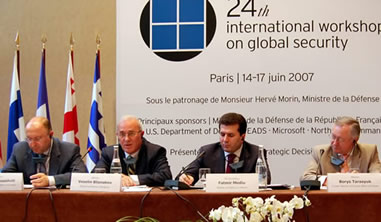Paris '07 Workshop |
Toward a Stable and Secure Black Sea Region
 |
His Excellency Dr. Vesselin Bliznakov |
|
| Bulgarian Defense Minister Dr. Vesselin Bliznakov (2nd from left) addresses the Black Sea panel with (from left to right) Georgian Foreign Minister Gela Bezhuashvili, Albanian Defense Minister Fatmir Mediu, and Ukrainian Foreign Minister Borys Tarasyuk. |
"...The military alone cannot be successful. We must build confidence
in the local populations.
Without their help, our missions will not be fully
accomplished. Moreover, we need to persuade neighboring countries to work for regional security.
It is rather difficult to create an island of security
in a single state, be it Iraq or Afghanistan."
First, I would like to mention a few words on the major topic of my intervention and that is our experience from the participation of the Bulgarian Armed Forces in the operations in Iraq and Afghanistan. Then I will also add some thoughts about the Balkan region, which is the topic of this panel.
To begin with our experience from the missions in Iraq and Afghanistan, which is quite a complex issue, I want to draw a conclusion using the words of Albert Camus – one cannot gain experience by experimenting, nor by creating it, one just has to live it through.
What we lived through in Afghanistan and Iraq has taught us valuable lessons – political, military, cultural, historic and, above all, human. The process of reconstruction will be long and difficult. And a lesson learned is that we need a different approach for our training, equipment, armament and combat effectiveness. This year, when we increase our contribution in Afghanistan almost 5 times, we understand how important it is to talk about these challenges.
Another significant lesson is that we should combine military and civilian expertise and effort. The military alone cannot be successful. We must build confidence in the local populations. Without their help, our missions will not be fully accomplished. Moreover, we need to persuade neighboring countries to work for regional security. It is rather difficult to create an island of security in a single state, be it Iraq or Afghanistan.
And finally – we, as allies, should have in advance of every operation a clear and complex strategy as to how we act to prevent a crisis, to enforce peace in an insecure region, and to build statehood. Effective work should be done for the economic development of the states where we are involved in an operation.
Now a few comments about the security challenges in the Balkan region being the topic of this panel:
The Balkan region continues to be a security consumer, rather than a security generator. The recent NATO accession of Bulgaria and Romania, and before that of Turkey, as well as the membership of Bulgaria and Romania in the European Union have huge importance for the stabilization of this part of Europe.
Another step should be to give a chance to other countries from the region to follow their European and Euro-Atlantic perspectives. I am happy that I often have the opportunity to meet my colleagues from the region. As you can see, today we also have the Albanian Minister of Defence, Mr Mediu, but I have regular meetings with my colleagues from Macedonia and Croatia as well. In Bulgaria we even initiated a 3+3 format. Bulgaria, Romania and Slovenia as new NATO and EU member states assist the new PfP countries Bosnia and Herzegovina, Montenegro and Serbia on their way to the accession in the Alliance and the European Union.
Nowadays the Western boundaries of the European Union are the coasts of France, Spain and Portugal. The Eastern frontiers of the European Union are the shores of Bulgaria and Romania and I assume that the countries from the Black Sea Region have to co-operate in order to secure the Eastern EU boundaries, because we know that around 70% of illegal trafficking in human beings, drugs and arms is being done by sea.
At the end of this month for the first time we will perform a large-scale military exercise of the land and air forces of Bulgaria, Romania and Serbia with the task of safeguarding the common boundaries, to overcome crisis situations, and to assist during environmental disasters. This is another step forward in the involvement of the new PfP states in our common idea – a more-secure Europe. My country, Bulgaria, is working in this direction and I am certain that our joint efforts will lead us to success.
